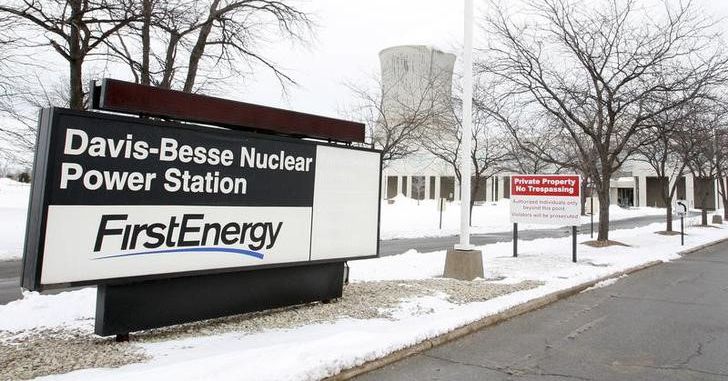The Davis-Beese nuclear power station is seen near Oak Harbor, Ohio REUTERS/Aaron Josefczyk
Register now for FREE unlimited access to Reuters.com
(Reuters) – A federal judge on Tuesday ordered shareholders’ lawyers in a derivative lawsuit against board members of the corruption-tainted Ohio utility FirstEnergy Corp to disclose the names of FirstEnergy corporate officials who paid millions of dollars in bribes to Ohio politicians.
The plaintiffs’ lawyers, who are trying to win approval of a proposed $180 million settlement in the derivative case, have been engaged in a weeks-long showdown over the disclosure with U.S. District Judge John Adams of Akron, arguing that confidential orders and litigation privilege concerns precluded them from publicly revealing the names of the executives who paid off Ohio politicians to obtain support for a bailout of FirstEnergy’s nuclear power units.
Adams rejected those arguments in Tuesday’s order. “This bribery scheme has undoubtedly shaken whatever trust that Ohioans may have had in the political process used by their elected officials,” Adams said in the order. “The public has a right to know how it is that the political process was so easily corrupted.”
Register now for FREE unlimited access to Reuters.com
In a subsequent filing before Columbus federal judge Algenon Marbley, who is also presiding over derivative litigation against FirstEnergy board members, shareholders’ lawyers from Bernstein Litowitz Berger & Grossmann, Saxena White and Cohen Milstein Sellers & Toll said they intended to comply with Adams’ order unless Marbley instructed them otherwise. Adams’ order, they said, also implicated a confidentiality agreement Marbley signed in the derivative cases before him.
Shareholders’ lawyers have sought approval of the proposed $180 million settlement from Marbley, not Adams, although, as I’ve reported, both are overseeing FirstEnergy derivative suits. When plaintiffs first told the two federal judges that they had reached a tentative deal and would move for approval in Columbus, where the lion’s share of the litigation has taken place, Adams expressed concern that the settlement would avert scheduled depositions of FirstEnergy defendants. The Akron judge also accused the parties of forum shopping to avoid his scrutiny of the proposed deal.
Adams first demanded the revelation of the names of the FirstEnergy officials who paid the bribes at an extraordinary hearing in Akron on March 9. Jeroen van Kwawegen of Bernstein Litowitz told the judge that he could not disclose the names, which had been produced in discovery in the case. When van Kwawegen refused to budge, as I told you last week, Adams abruptly ended the hearing and left the bench.
Plaintiffs’ lawyers argued in a post-hearing brief that they had learned the bribe payers’ identity through discovery produced under confidentiality orders and could not reveal the information publicly, although they offered to provide the names under seal or in camera. Shareholders’ lawyers also said the identity of the wrongdoers was discussed during the mediation that led to the proposed settlement, so the names were shielded by mediation and work-product privilege.
FirstEnergy’s special litigation committee, composed of four independent directors appointed after the scandal broke, also told Adams in a March 16 brief that the derivative case is not the right vehicle for vindicating the public’s interest in the corruption plot. The committee’s lawyers at Debevoise & Plimpton said the Justice Department, which reached a $230 million deferred prosecution agreement with the company last summer, is continuing to investigate the bribery scheme, with FirstEnergy’s cooperation, to assure that there will be public accountability for the wrongdoing.
By contrast, Debevoise said, the derivative case addresses only the harm that FirstEnergy board members caused to the company. “The court’s desire for public accountability, while understandable, risks harm to the interests of FirstEnergy and its stockholders, which is exactly the opposite of what a derivative litigation is supposed to do,” the litigation committee brief said.
Adams’ order on Tuesday said that if the litigation committee is correct and the bribe payers’ identity will eventually be revealed in the DOJ’s criminal investigation, then there is no harm in disclosing the same information in the derivative case. He also said that the company’s interests are not the only concerns in the litigation, “given that it is alleged that FirstEnergy executives perpetrated a scheme that impacted nearly every Ohioan.”
Adams once again accused shareholders and defendants of trying to cut him out of the settlement review process, warning that their alleged forum shopping undermines public trust in the agreement. “All of the purported goals in the complaint – holding defendants accountable and making FirstEnergy whole again chiefly among them – are thwarted,” Adams wrote. “The public will have no confidence that a fair resolution was reached when so few details are made public, especially when the parties have gone to such great lengths to attempt to shield discovery from the public.”
At the March 9 hearing, van Kwawegen vehemently rejected Adams’ assertion of forum shopping, pointing out that the Akron judge never appointed lead counsel in the lone derivative case filed in his jurisdiction. As I’ve reported, Marbley acted far more quickly, consolidating several FirstEnergy derivative cases filed in Columbus, appointing lead counsel and even denying a defense dismissal motion before Adams decided not to transfer the parallel case in his court to Columbus.
As of Wednesday morning, Marbley had not docketed a response to the shareholders’ filing alerting him of their intention to abide by Adams’ order and disclose the names of the bribe payers.
I emailed shareholders’ lawyers van Kwawegen, Joseph White and Steven Toll and special litigation committee counsel Susan Gittes and Maeve O’Connor of Debevoise but didn’t hear back. Defense counsel for individual FirstEnergy defendants in the derivative litigation also did not respond.
Read more:
Shareholder lawyers push back at irate judge’s demands in $180 million FirstEnergy case
Federal judges in tug-o-war, $180 mln derivative deal caught in between
FirstEnergy agrees to pay $230 mln to settle U.S. bribery charges
Register now for FREE unlimited access to Reuters.com
Our Standards: The Thomson Reuters Trust Principles.
Opinions expressed are those of the author. They do not reflect the views of Reuters News, which, under the Trust Principles, is committed to integrity, independence, and freedom from bias.




